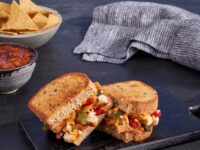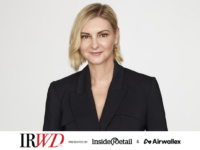To call Jaimee Lupton, a New Zealand-based PR executive turned beauty brand founder, ‘entrepreneurial’ would be putting it lightly. Over the past seven years, Lupton has co-founded five beauty brands (in chronological order); Monday Haircare, Châlon Paris, Being Haircare, Laura Polko Los Angeles and Daise Beauty. Several of these brands have become top-sellers with American retailers including Ulta Beauty, Costco and Walmart. Inside Retail connected with the driven
Unlock indepth features,executive

Unlock indepth features,executive
interviews and quarterly magazines
SUBSCRIBE NOW
Already a Premium subscriber? Log in
Just for$39.95per year

To call Jaimee Lupton, a New Zealand-based PR executive turned beauty brand founder, ‘entrepreneurial’ would be putting it lightly. Over the past seven years, Lupton has co-founded five beauty brands (in chronological order); Monday Haircare, Châlon Paris, Being Haircare, Laura Polko Los Angeles and Daise Beauty. Several of these brands have become top-sellers with American retailers including Ulta Beauty, Costco and Walmart. Inside Retail connected with the driven brand founder to learn more about what drives her passion for accessible “luxury” beauty brands and the secret to connecting with Gen Z and millennial consumers. Inside Retail: Prior to launching Monday Haircare and your following brands, you were working in the public relations space. What inspired the transition from PR to becoming a CPG brand founder?Jaimee Lupton: It was working in an agency where I really wanted to create something myself. When I started building out Monday Haircare, my partner [Nick Mowbray] and I were walking the supermarket aisles, and I thought that I could 100 per cent create a masstige beauty brand here on these shelves. I wanted to create something different that had the look and feel of a luxury product, but at a mass product price point. IR: What inspired your passion for launching beauty brands, especially those within the more price-accessible tier?JL: I think there were lots of exciting brands popping up, like The Ordinary and Glossier, that were helping democratise skincare in the beauty space. But when it came to haircare, there wasn’t really anyone doing it in a truly modern way and making it accessible. There were so many mass haircare brands, but they didn’t reach the benchmarks that Gen Z and millennial consumers were after, such as being cruelty-free, sulfate and paraben-free free and with a really beautiful aesthetic as well.We wanted to create a premium, modern product that looked good in people’s bathrooms, but without a high price tag. Separate from that, my background in public relations and communications, working on some of the biggest brands in the world, taught me a lot about the luxury beauty space. IR: What were the more technical steps that went into launching your first beauty brand, Monday Haircare?JL: So with Monday Haircare, I think it [the brand-building journey] was quite unique. We approached [Monday] as if it were solely a direct-to-consumer brand, but then we shortly partnered with mass retailers after launch, which I think was not as common at the time. A lot of people start out DTC before scaling into mass retail.Obviously, partnering with great retailers like Ulta Beauty, Target and Costco has been amazing for us. Now, with Monday Haircare, we’ve partnered with over 200 retailers, scaled globally across 43 countries, and are on track to do US$600 million since we launched in 2020. Additionally, around 90 per cent of our marketing budget is spent on digital, it’s what we live and breathe.Monday Haircare is the number one haircare brand on TikTok globally, something that we’re super proud of because that’s where our customers come from and where people largely discovered us. TikTok has been a big part of our growth strategy. We’re completely customer-obsessed, so we listen and learn from what she’s [the customer] loving and what she’s buying and harness that knowledge into our product development. IR: What factors do you think helped Monday Haircare stand out in a very saturated market of the beauty industry?JL: I think we just did things differently. When everything else was “screaming” in the haircare aisle, we like to say we were “whispering” with our beautiful millennial pink packaging. Taking cues from luxury brands, we created something that people were proud to show on their shelves, which we call a “shelfie”.My team and I are largely comprised of Gen Z and millennials, so we were really creating brands for ourselves and understood what customers wanted, which is a superpower in itself. IR: Speaking of Gen Z, it seems like you’re really speaking to them and their younger cohort, Gen Alpha, with Daise Beauty, which launched in late 2024. What is Daise Beauty, and how has it been able to capture the attention of Gen Zalpha?JL: We wanted to focus on the crossover of Gen Alpha and Gen Z, or Gen Zalpha as I’ve coined them, as they are now the fastest-emerging cohort of beauty consumers.They’re outspending all other generations of shoppers and absorb 90 per cent of their beauty buying power through TikTok. They have huge knowledge and a great appetite for fragrances, so we created Daise, which is a mood-matching, fragrance-based body care brand.We brought the brand to life via really fun formats, such as the daisy shape of our packaging, which really stands out on a shelf.Within just the first four days post-launch, we sold over a million dollars’ worth of product. It’s also a really exciting brand to be a part of in how we can develop new products within this brand. Where Monday Haircare is within the more traditional haircare segment, it makes it quite hard to experiment with.With Daise Beauty, we’re definitely going into really fun segments and formats. IR: In addition to Monday Haircare and Daise Beauty, you also co-founded Being Haircare, which is exclusively sold at Walmart and two other brands. Are you planning to focus on those five brands for the time being, or are you already working on something else?JL: Not to sound crazy, but we definitely have other brands in the pipeline that we are developing, just to stay ahead of the trends. IR: Having now co-founded five brands, what is a piece of advice you wish someone had given you at the beginning of your retail journey?JL: You’ve got to get really comfortable with fixing problems at the beginning. Anytime a problem came up, it used to quite stress me out, and I didn’t really know how to handle it. But at the end of the day, owning a business and doing what we’re doing on a global scale, problems are inevitably going to come up. It’s how you navigate those problems and how quickly you move on from them that marks success.In our company, we call it “fast fail”. If something goes wrong, that’s fine. We take the learnings and move on fast from failure.















